LEGACY

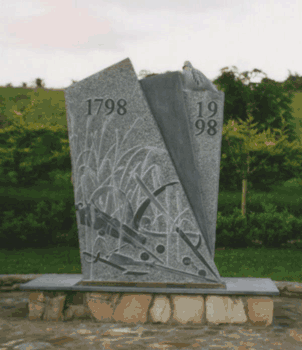
Monument du bicentennaire

An Taoiseach
Bertie Ahern T.D.
Speech by An Taoiseach Bertie Ahern T.D.,
at the
Humbert Bicentenary Dinner
Humbert Summer School,
Downhill Hotel, Ballina
Friday, 21 August 1998 at 8.00 p.m.
Mr Chairman, Ministers, Excellencies, Distinguished Guests, Ladies and Gentlemen.
It is a great pleasure and honour for me to be here in Ballina tonight, even if your Summer School has had to meet against the appalling backdrop of the horrific atrocity perpetrated in Omagh on Saturday last.
This evening, I propose, first, to address briefly the issues raised by Omagh and then to make the address I had prepared for this evening, which, I believe and hope, remains very relevant in the post – Omagh situation.
The last week has been a difficult, dangerous and tragic time.
All our hearts went out, over the past few days, to the grief-stricken families burying their loved ones, to all those maimed and injured, and to all the relatives, friends and communities of all those affected by this evil act.
 Tomorrow, with President McAleese, I will be in Omagh for the local service being held there, as part of the acts of prayerful reflection being organised throughout the country at the request of the church leaders, which the Government have urged all our people to attend.
Tomorrow, with President McAleese, I will be in Omagh for the local service being held there, as part of the acts of prayerful reflection being organised throughout the country at the request of the church leaders, which the Government have urged all our people to attend.
It is important, and as we all know from personal experience, it is always a great help to the bereaved, to show that, nationwide, we mourn and grieve with them for the victims of Omagh.
But as a responsible democratic Government, my colleagues and I have had to respond to the security and political challenge represented by the Omagh outrage. We have done so decisively.
There is one Government of the Republic duly elected by the people.
Further, we now have a democratic system in Northern Ireland that has been endorsed by the people, including the overwhelming majority from the Nationalist and Republican tradition, both North and South.
Arguments about legitimacy, which have given rise to so much conflict since 1921, are over.
Republicanism in its origins was a democratic philosophy.
It was so understood by Pearse and most of those who fought for our independence. Never again must we allow a gap or conflict to open up between Republicanism and democracy.
As far as this State and the entire Nationalist tradition are concerned, they must once again become one and indivisible.
The Government have been resolute this week in defence of democracy.
The decisions we announced on Wednesday last as to security and legislative measures can leave no doubt that we are determined to crush violence and to suppress those who perpetrate it.
We shall not hesitate to use the powers vested in us in all their plenitude to defend peace and democracy on this island against any who may persist in defying the will of the people of Ireland.
I very much appreciate the opportunity to make some remarks at this Bicentenary Humbert Summer School, for the Humbert School has done so much to promote a high level discourse on public policy over the years.
I believe the summer school movement, with its dispersal around the country, and its vigorous interaction between politicians, scholars and people is a distinctive Irish contribution, a very valuable one and a truly republican one, to the working of democracy.
And Republicanism is in fact, your theme this year, one that is very close to my heart.
It is also entirely appropriate in that there were such close links between French and Irish Republicanism in the late eighteenth century and that it was in pursuit of the republican ideal that the Humbert expedition was despatched to the West of Ireland 200 years ago.
Republicanism, in its best, humane, inclusive, anti-sectarian sense, is one of the living legacies bequeathed to us by the United Irishmen.
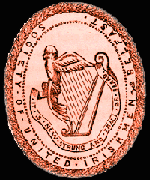 The United Irishmen emerged in the 1790s, when an opportunity presented itself to transcend the age-old sectarian, ethnic and political divisions of the island.
The United Irishmen emerged in the 1790s, when an opportunity presented itself to transcend the age-old sectarian, ethnic and political divisions of the island.
The United Irish movement aimed to demolish a political system rooted in sectarian privilege and to replace it with a secular politics, founded on the universal republican ideas of equality, justice and a representative democracy.
But they faced powerful opposition from many quarters. That opposition and unfavourable fortunes defeated them.
With the blockage of the project to create a republican model of government, on inclusive and pluralist lines, the split in Irish politics developed into two fragments, nationalism and unionism, which still dominate the political landscape today.
Like the United Irishmen, we face the task of putting in place an agreed political structure, capable of representing Irish people in all their inherited complexities.
Happily, we have taken a major step along that road with the Good Friday Agreement.
There is a peculiar aptness in the fact that the votes in the referendums, in which the people, North and South overwhelmingly endorsed the Agreement, were counted 200 years to the very day the rebellion broke out.
The United Irishmen’s ideas did not die with the events of the ’98 Rebellion. They are still potent, still valid. Because they faced problems like sectarianism which still disfigure modern Ireland, the United Irishmen are very much our contemporaries.
It is their enduring political legacy that we, as a Government, have stressed in the bicentenary commemoration. And we also seek to give practical effect to their political vision in arrangements for government which command the support of the vast majority of the people who live in Ireland.
Obviously, the United Irishmen were heavily influenced by events in France. They saw the evolution of a republican state there as a perfect answer to the question of how one redefined a sectarian state such as Ireland, as it was then.
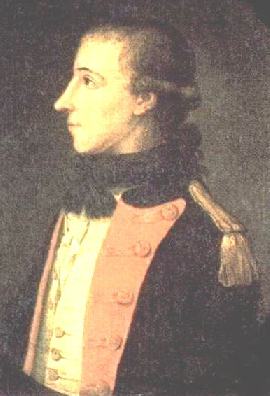 Theobald Wolfe Tone became the main interpreter of the French Revolution for an Irish audience.
Theobald Wolfe Tone became the main interpreter of the French Revolution for an Irish audience.
Tone argued that the old equation, on the part of libertarian Protestants, between Catholicism and despotism, had been rendered obsolete by the Revolution and that Irish Catholics would demonstrate the same political maturity as their French counterparts.
Once Catholics could be accepted as citizens, the parliamentary reform movement could at last achieve its aims.

The French Revolution, by universalising the narrowly Protestant concept of liberty, and by occurring within a Catholic state, released sectarian gridlock.
Its promotion of human rights offered an alternative path to the idea of political community.
The universality of the republican principles of liberty, equality and fraternity furnished a neutral language with which to consider the characteristics of a just state.
The republican project supplied an alternative basis for uniting disparate peoples, generating the possibility of a common political home, based on compliance with ethical rather than ethnic principles, on justice, not ‘history’.
A window of opportunity was opened in Ireland by the impact of the American and French Revolutions. The moment was brilliantly seized by the United Irishmen.
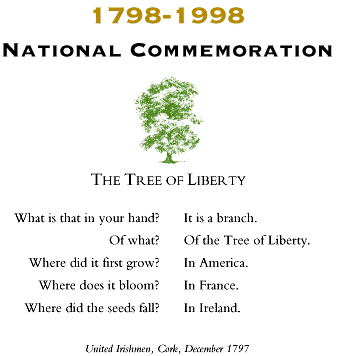 They imaginatively created a vision of non-sectarian, democratic, inclusive politics, which could attract and sustain all the people of Ireland whatever their ancestry or religion.
They imaginatively created a vision of non-sectarian, democratic, inclusive politics, which could attract and sustain all the people of Ireland whatever their ancestry or religion.
Rather than seeing religious, ethnic and political diversity as a paralysing problem, the United Irishmen saw the challenge of constructing a wider, more tolerant vision of Irish identity.
Rather than clinging grimly to a divided and divisive past, the United Irishmen sought to create a shared future, a cradle of possibilities.
By facing into the future rather than the past, they sought to heal the hurts of Irish history in a brotherhood of affection, a fellowship of freedom.
In their first declaration of principle, they stated in words which echo across the chasm of two centuries:
‘We have thought much about our posterity, little about our ancestors. Are we forever to walk like beasts of prey over the fields which these ancestors stained with blood?’
By linking parliamentary reform and the Catholic question, the United Irishmen created a moment of great political optimism in the early 1790s.
That moment passed and the decade ended in a bloody uprising, at the cost of 30,000 lives. What happened to derail the United Irish project?
The 1790s was a pivotal decade in modern European history. Britain and France were locked into an international battle for domination, in which Ireland was caught up, willy nilly.
By the early 1790s it was becoming increasingly clear that the French Revolution would unleash a titanic European struggle between ‘democracy’ and ‘aristocracy’, between Republicanism and Monarchy, between liberty, equality and fraternity and the old régime.
Burke’s conservative ‘Reflections on the Revolution in France’ and Paine’s caustic republican response, ‘The Rights of Man’ established the battlefield as one of ideas.
 As France and Great Britain moved inexorably towards conflict, it became apparent that this would be the first modern war, a new war of principle and ideology rather than an old war of tactical and dynastic advantage.
As France and Great Britain moved inexorably towards conflict, it became apparent that this would be the first modern war, a new war of principle and ideology rather than an old war of tactical and dynastic advantage.
In these circumstances, once war formally broke out in 1793, the United Irishmen, grudgingly tolerated in peace-time, were immediately banned as a potentially treasonable organisation.
The failure of General Hoche and, later, of General Humbert was at great cost to Ireland, over which Britain’s strategic interest prevailed. That cost was the insertion of sectarian principles at the very heart of the governance of Ireland, creating a gaping hole in the fabric of Irish civil society.

General Humbert
I should say here, to the credit of these two French generals, that they were both humane men, determined to avoid unnecessary bloodshed, the terrible consequences of which they had seen in France.
The civilian population and minorities were protected by Humbert.
The United Irish challenge was suppressed. The consequence was the sidelining, for that time, of the pure, untainted ideology of Republicanism, and with it the best means of achieving a just and lasting solution to the Irish problem.
The other victim of 1798 was the truth of what happened in the Rebellion.
Almost as they were happening, the events of 1798 were being recast in terms of memory.
As with the politics, the memory also split into two fragments.
In the Unionist one, 1798 was figured as a sectarian blood bath, yet another chapter in the Protestant Book of Martyrs.
In the Catholic Nationalist one, 1798 became a struggle for faith and fatherland, in which the United Irishmen and Northern Presbyterians were airbrushed out of a picture increasingly dominated by the clerical collar of ‘Father Murphy’.
The truth is that people of all ancestries, of all traditions, of all religions, played an honourable part in the United Irishmen and in ninety-eight, in the South-East, in the North, here in the West and indeed as contemporary accounts published in our newspapers show, in every part of the country.
 In the 1790s Belfast, the ‘Athens of the North’, was the birthplace of the Society of United Irishmen. The Ulster Presbyterians provided many of the most talented leaders of the emerging radical movement.
In the 1790s Belfast, the ‘Athens of the North’, was the birthplace of the Society of United Irishmen. The Ulster Presbyterians provided many of the most talented leaders of the emerging radical movement.
Their generosity of spirit, political vision, imaginative inclusiveness and commitment to the principles of justice remain, to this day, an honour to the tradition from which they sprang, even though this distinguished period does not figure prominently in their current self-image.
Flickering hesitantly behind the obscuring smoke of ‘Twelfth’ bonfires, there is another, more generous history and philosophy of Ulster Presbyterianism.
They are aware of it, and many take pride in it, as shown by the wide interest in the bicentenary commemoration throughout Northern Ireland, but, in their majority, they remain rather wary of it.
By elevating the politics of this country out of the divisive rut in which they have been confined since 1798, the dead weight of the past can be lifted and political buoyancy restored.
By excavating the true meanings of the rebellion, as we have sought to encourage this year, 1798 can be understood in a fresh and invigorating way, thus opening a generous space in which to take political inspiration from it.
We have, this year, taken that inspiration and applied it in a creative, innovative way to bring about a sustainable but open-ended accommodation in regard to the Irish Question.
The United Irish project of an inclusive, democratic, non-sectarian Ireland remains uncompleted, as recent sad events have shown.
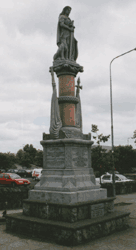
Ballina Memorial
But we have crafted a political framework, incorporating a balanced address to constitutional issues and fair and balanced political arrangements spanning the three main strands of relationships within these islands, which will enable us to make decisive progress towards completing that noble project.
We must maintain the momentum, we must demonstrate that this is a win-win situation for all sections of society on this island. I remain confident that by doing so, we can realise the high hopes that were dashed in the August and September of 1798.
The keys to progress now are, firstly, faithful implementation of the Agreement in all its aspects and secondly the building of relations of trust and of partnership.
The Irish Government have been very active on both these fronts and we will maintain a very close concentration on implementation of the Agreement.
We have pressed forward through the summer with the action to be taken in our own jurisdiction, whether in regard to the amendments of the Constitution, to prisoner releases, to action to meet the concerns of victims, to the steps to which we are committed in the human rights area, to action to accord further recognition to the British strand in Irish life or the preparations for the discussions to take place on North-South interaction and co-operation, including the establishment of all-island implementation bodies with executive functions.
And we have been engaged in the most intense interaction with the British Government in regard to the steps to be taken by them in relation to Northern Ireland.
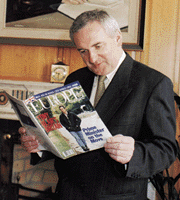 The main British legislation to carry the Agreement into effect has now been passed by the House of Commons and will be dealt with by the House of Lords in the autumn before the commencement of the next parliamentary session.
The main British legislation to carry the Agreement into effect has now been passed by the House of Commons and will be dealt with by the House of Lords in the autumn before the commencement of the next parliamentary session.
This very substantial legislation was, to the credit of all concerned, prepared under intense time pressure and, perhaps because of that, neither we nor Northern nationalists were initially satisfied that it faithfully reflected the Agreement in every respect.
However, quite a number of amendments were made as the Bill went through the House of Commons.
Having regard to these and to undertakings given by the British Government to consider other points put to them, I and the Irish Government are now broadly satisfied that the Bill, when enacted, will fully respect the Good Friday Agreement.
The Governments are playing their part. There is, certainly, more to be done. But I want to acknowledge that the British Government of today, in many ways is in as powerful a position in the House of Commons as was that of William Pitt in 1798, is using its power in the opposite direction.
It is using it, not to block constitutional change and reform, but to create from Westminster, in some cases jointly with Dublin, institutions with which all can identify, where power will be shared and common action taken in agreement.
Others, too, must play their part. Over the past thirty years, the Nationalist and Republican community has devoted nearly all its energies to dismantling the domination to which they were subjected under the 1920-21 partition settlement.
But building the framework in which Irish people of different traditions can come together, work together, live together, requires a different and less antagonistic approach.
Habits of trust and co-operation have to be established. It is worth breaking long-hardened moulds to advance this.
There have to be clear signals that the past is being put behind us.
That applies on all sides, but as your theme here is Republicanism, let me first address the nationalist and republican communities.
With the Good Friday Agreement we have, as I said earlier, a unique opportunity to realise the vision of the United Irishmen, the true republican vision that animated Ninety-Eight.
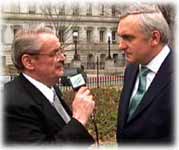 All of us must reach out to our Unionist neighbours, as the Belfast Presbyterians of the 1790s reached out to their Catholic fellow-countrymen and women.
All of us must reach out to our Unionist neighbours, as the Belfast Presbyterians of the 1790s reached out to their Catholic fellow-countrymen and women.
It must be put beyond doubt that so far as the democratic nationalist and republican traditions are concerned, violence is over and done with, that never again will they engage or acquiesce in acts of violence of any kind. Peace must now be definitively restored and consolidated, so that people can have confidence in its durability.
Croppies will never again lie down, nor should they. But, difficult as it may be for some in the light of their experiences, Nationalists have to display a magnanimity that was rarely shown to them.
In that regard, I applaud the recent local accommodation in Derry in regard to the Apprentice Boys Parade.
In implementing the Good Friday Agreement, it is essential to avoid introducing new, formal preconditions that are not in the Agreement. Equally, all of what is in the Agreement must be implemented and in the spirit as well as in the letter.
The provisions on de-escalation of security measures have to be implemented, so also must those on co-operation with the Independent Commission on Decommissioning.
And so must those on punishment attacks, beatings and shootings which occasionally end in punishment killings, the continuation of which is incompatible with the spirit that animates the Agreement.
The barbarity involved is utterly abhorrent and totally at odds with the vindication of human rights pursued in other contexts.
The implementation of the Agreement poses challenges to practices and attitudes that had become deeply entrenched over thirty years of violent conflict and suspicion. And, of course, these difficulties are by no means confined to the Nationalist side.
It is true that all of us who are Nationalists, in addition to carrying out our own commitments, need generously to acknowledge how far the Ulster Unionist leadership has been prepared to come to make a settlement. But, as we face up now to such issues as the formation of the shadow Executive, the guideline again has to be faithful implementation of the Agreement.
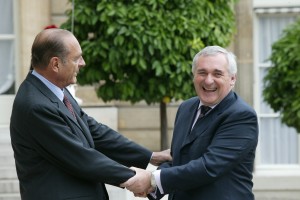
French President Jacques Chirac & Prime Minister Bertie Ahern celebrating French-Irish Friendship
On all sides, there has to be a commitment to this and an acceptance of responsibility to engage in inclusive dialogue, face to face, to build mutual confidence with courage and to work together.
It is also necessary that the Unionist community face up to the full implications of equality within Northern Ireland between the two traditions.
We need parallel, mutually reinforcing action on all the commitments in the Agreement, inspired by a bold and generous spirit.
Republicanism is therefore always about opening rather than slamming the door on the future. It is about moving on, neither handcuffed to our history, nor heedlessly fugitive from it.
Republicanism is always about how to create a human society fit for our children to live in.
It understands that tradition is not a prison in the past but rather a dynamic force which uses the past to shape the future, to create a mature, modern nation, of economic prosperity, social harmony and cultural creativity – of liberty, equality and fraternity.
